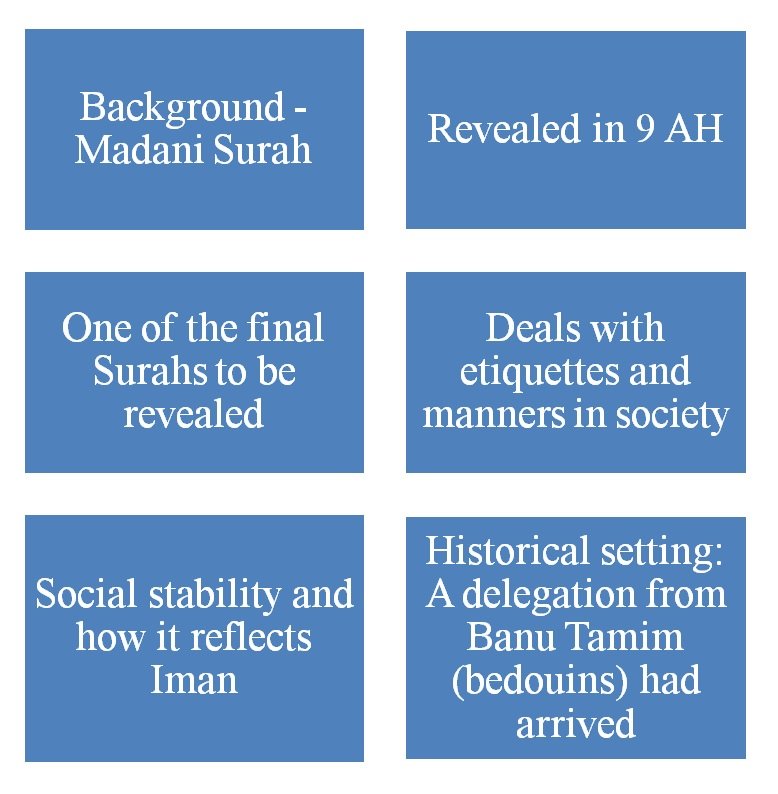
“O mankind! We have created you from a male and a female, and made you into nations and tribes, that you may know one another. Verily, the most honourable of you with Allah is that (believer) who has At-Taqwa [i.e. one of the Muttaqun (pious)]. Verily, Allah is All-Knowing, All-Aware.” (Al-Hujurat 48:13)

In Ayah 13, we look at what Allah (swt) has commanded to all of humanity, not just believers. The call is to every member of society – a general rule for everyone on how to interact with each other or groups comprised of each other. Islam gives equal respect to everyone because, as humans, we are all Allah’s (swt) creations.

– The same word is used for coral reef in the Arabic language. This word has two opposite meanings – separation (branching out) or connection (at the base), i.e., starting from one point and separating out or starting from branches and gathering into a single point. Example: From Adam (as) and Hawwa come every human being or all human beings go back to one father and one mother. All nations branch out into tribes and also further into smaller family groups. They all look different, as every person is unique based on their skin color, facial features and other characteristics. There is no concept of racism in Islam; it is not tolerated by Allah (swt). Allah (swt) created everyone – believers and disbelievers – equal. Think about it:
- Why do you put people down?
- Why are you proud of yourself?
- Why do you fight people?
- Why do you not see everyone as equal?
- Why do you differentiate among people?
- Do you have anything to do with the creation of another being?
Each tribe speaks a certain language or has a certain financial/educational status; Allah (swt) chose our nation and tribe for us. We think we know best, but only Allah (swt) and His Messenger (sa) know best. The true blessing is that of Iman. Why should we degrade others due to something they have not and cannot choose? This Ayah removes discrimination, stressing that no one is better than another. The point is that we benefit from each other’s cultures and learn from shared virtues. The fact that we are born in a certain country or into a certain family does not give us the right to be arrogant due to heritage. This was Allah’s (swt) will alone; our existence is not our choice.

Preserving the bonds of kinship (Silatur-Rahim) has significant importance in Islam. Getting to know each other is vital for the success of societies. We should know who our relatives are in order to appreciate the family structure and enjoy good relationships with our kin. Being aware of relationships among families, tribes, and nations creates empathy and love within that structure.

Finally the closest to Allah (swt) and the most valued by Him is one who has Taqwa (piety). The criteria are not family association tribal links or skin colour – the defining factor is Taqwa. Only Allah (swt) knows what is in someone’s heart; only He can decide who has Taqwa. Your tribe, nation or family will not give you honour in front of Allah (swt). Your tribe, nation, or family name will not bring you closer to Allah (swt). Only Taqwa is the measuring scale for your relationship with Allah (swt). We are warned that we must not be judgemental about another person. Prophet Muhammad (sa) chose Bilal ibn Rabah (rtam), a former slave, for calling out the Adhan. He did not choose anyone from his family or other Arab Sahabah; no one questioned him – they all simply accepted his decision. This is what our attitude should be like; if Allah (swt) chooses someone, He knows best. It is not because of what we see in them and how we judge them. Hence, the Ayah ends with “Verily, Allah is All-Knowing, All-Aware.”

Allah’s (swt) knowledge encompasses everything – the apparent/hidden, future/present, possibilities/impossibilities, seen/unseen – nothing is hidden from Him. Allah (swt) is All-Aware of the “hidden” things – even the small things hidden in your heart. When used with the word العليم, additional depth and nuances are added to the meaning. Allah (swt) is All-Aware of things deep inside, hidden, secret, and unseen. He knows everybody’s secrets and so He is the only One Who can judge and assess Taqwa.
Keep in mind that this command and the attributes of Allah (swt) mentioned in Ayah 13 come after verses that talk about backbiting, calling others hurtful names and making false accusations, or, in other words, all the things a person uses to ridicule others. Allah (swt) now tells us that we are not qualified to judge. During the Farewell Sermon (Hajj), the Prophet (sa) advised the Ummah that the only redeemable quality on the Day of Judgement will be a person’s level of piety in front of Allah (swt) not who he was in life, his family name, or his connections; none of the latter things will benefit him. The test is Taqwa, and only Allah (swt) has knowledge of who the best is.
- If a person thinks very highly of his family name or status, it will lead him to transgress the boundaries defined in this Surah. He will become proud and arrogant.
- On Judgement Day, one of the questions that will be asked is: “Where are the pious?”
- The righteous will be honoured in front of everyone on the Day of Judgement.
We should focus on building our own character and safeguarding our Iman.
Adapted for Hiba Magazine by Tasneem Vali (Canada)







